While the name “Persia” (Western historical name of Iran) has attracted tens of thousands of people from around the world to London’s British Museum to visit ancient Persian artifacts, the Nuremberg-based music company, Colosseum, invites Europeans to listen to eight masterpieces of Persian symphonic music.
Tag Archives: Hossein Dehlavi
Latest posts
- Transition to Enlightenment: Six Lectures on Mozart’s String Quartets (5)
- Nasser Masoudi: The Voice of Gilan and a Legacy of Iranian Music
- Farhad Poupel: The Voice of the Shahnameh in the Orchestras Around the World
- Five Major Myths About Mozart’s Life
- Bahma Rajabi Passed Away!
- Reza Vohdani; Unveiling unpublished works, preservation of Iranian classical music
- Ahmad Pejman Passed Away!
- Timeless or Timely: The Role of Historical Context in Defining Artistic Value
- Leading the Charge in Censorship
- The Legacy of Khosrow Jafarzadeh
- Transition to Enlightenment: Six Lectures on Mozart’s String Quartets (4)
- Fereydoun Shahbazian, An Iranian Musical Icon Passed Away
From Past Days…
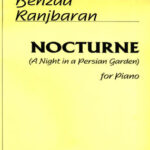
A Persian Nocturne for Piano
A Night in a Persian Garden is the name of a Nocturne composed by the Persian (Iranian) contemporary composer Behzad Ranjbaran. This Nocturne, published recently by the Theodore Presser Company in the US, was performed for the first time in 2002 in New York City by the young Persian pianist Soheil Nasseri and has enjoyed many performances by other pianists.

The Structure of Kurdistan Daf (V)
ehrouz Mohammadi, “Daf and its feasts in Ghaderieh’s Tekyeh” mentions that the outer thickness of arch where studs are located, [is] between one to one and a half centimeters (Mohammadi, 2001: 12). The thickness of arch should be gradually reduced from the installation place of rings to skin (Avazeh of Daf) to create a high volume, clear sound from Daf; also, the connection of arch to skin should not be less than one millimeter, because in this case the skin will be torn due to the sharpness of the wood (Mogharab Samadi, 2009: 79-78). The thickness of wood on the skin side is about two to three millimeters (Tohidi, 2002: 79).
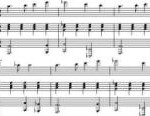
Iranian Fallacies: Iranian Chords
Finding a way to harmonize the Iranian music has been the subject of controversy among Iranian musicians for a long time. Some believe in the creation of harmonies for Iranian music based on a method which is similar to the tierce harmony; while others have either selected or invented some other methods. There are also some musicians who do not basically agree with the harmonization of the Iranian music.

Developments in Iranian Music Since Qajar Era (III)
Developments in Composing
Along with developments in the Iranian instruments, composition of the Iranian pieces developed as well. As a matter of fact, the developments of the two, mutually affected each other. In other words, instrumental developments led to developments in composition and vice versa.
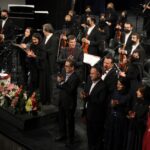
Motherland Orchestra Broke the Spell of the Covid-19 Restrictions
The Motherland Orchestra staged the first concert since the outbreak of the pandemic under the baton of Nezhat Amiri. The orchestra went on stage on December 23-24, 2021 in memory of Rouhollah Khaleghi and Golnoush Khaleghi at Vahdat Hall, Tehran, Iran. Since the pandemic outbreak, concerts were held online and restrictions were imposed on in-person concerts.
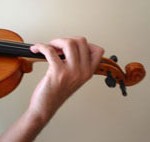
Principles of Violin Playing (VIII)
1.5.1.3.sometimes, a player, due to different reasons, may decisively want to play continuously two notes with a half-step by means of the same finger, in such a case, it’s necessary to open the interior curve of the finger like a spring. Naturally coming back, the curve of finger should be closed and the finger should become curved shape again (see paragraph 3.1.2.1).
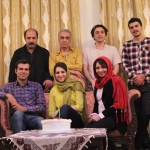
HarmonyTalk Celebrates 11th Anniversary
April 6 marks the anniversary of launching HarmonyTalk.com. Back in 2004, HarmonyTalk was rather a blog dedicated to music. Gradually, however, it found its way to becoming a more sophisticated journal with an intensive but not exclusive concentration on classical music.

Simorgh Criticised
Simorgh (Simorq) Orchestra was founded by the renowned Iranian composer, Hamid Motebassem, in 2011. Simorgh Orchestra is the largest orchestra featuring Iranian national instruments. Although the orchestra established by Master Hossein Dehlavi, the great Iranian composer, in 1993 was larger than Simorgh Orchestra, it only featured the Iranian plucked string instruments unlike the latter one. The first album which was recorded by the Orchestra, conducted under Motebassem’s baton, was his Simorq based on Zal story from Shahnameh by Ferdowsi, the great Iranian poet.
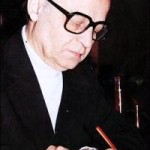
Hossein Dehlavi: the Composer
With Dehlavi it is not all about fame but recognition. Hossein Dehlavi is not a popular musician (like pop singers) whom everybody might know when he is walking on streets of Tehran; however, he is recognized by both amateur and distinguished musicians of the country.

A Promising Concert by National Instruments Orchestra
The National Instruments Orchestra of Iran performed its first concert amid much hope and anxiety on July 18, 2015. The Orchestra is founded by Roudaki Cultural and Arts Foundation which is a semi-private foundation in Iran. The Arts Director for the National Instruments Orchestra of Iran is cand the Orchestra Executive Director is Sadjad Pourghand.